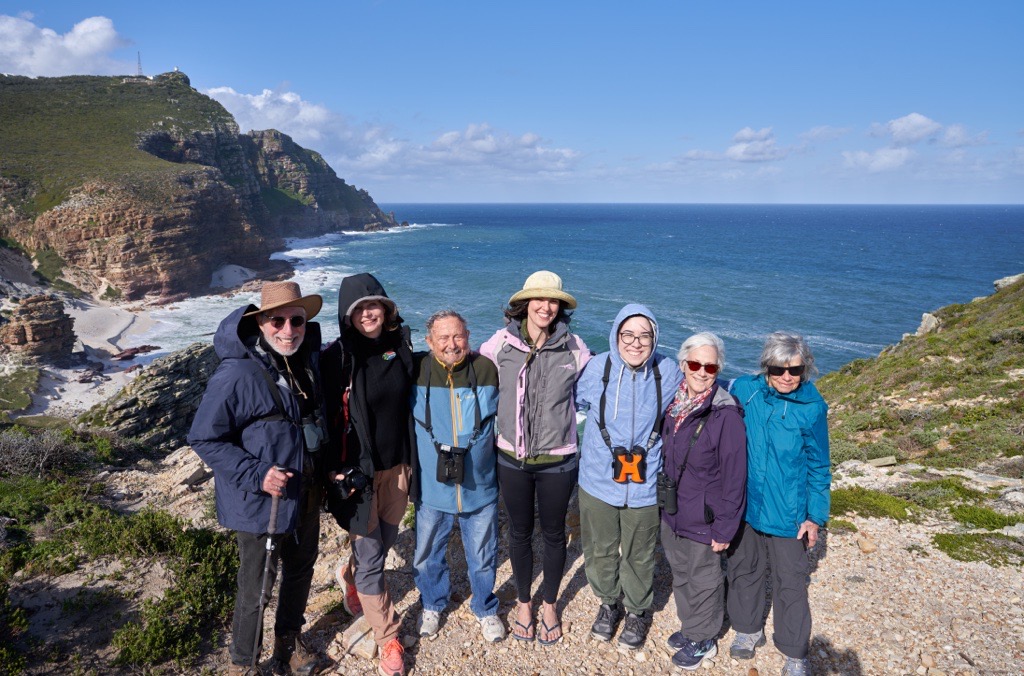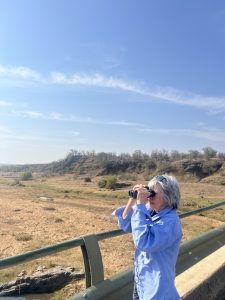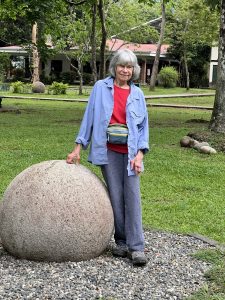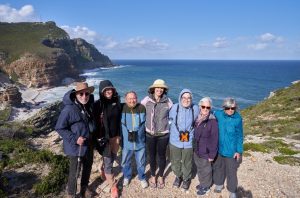Joyous Experiences with OTS
By: Joy Schochet, OTS Experiences Alumni Class of 2024 and 2025
I had the good fortune to grow up in a village on a lake in northern Minnesota. I waited eagerly for spring, when chipmunks emerged from under the leaves in our window wells where they sheltered for the winter, and when the first birds arrived (although I never could identify many beyond “robin,” “ruby-throated hummingbird” and “red-headed woodpecker” (I am still stuck there). My friends and I spent summers swimming, and we picked wild berries, hiked and camped. In fall, we had gorgeous displays of leaves in festive reds and oranges and in winter nature sent us ice and snow. We were immersed in nature. Now, you might say, “good grief, why are you writing about yourself and not about your OTS trips?” As Jane Austen would have said, “Wait, Dear Reader” and you will see….
Well, I grew up. I became a biologist. I lived in urban areas for the most part, but remained attached to nature with summer research at the Marine Biological Laboratory on Cape Cod, teaching in Southeast Asia (tropical rain forest!), doing research with crabs at a Thai fisheries station, visiting several times the Peruvian Amazon while on the board of a rainforest conservation organization and spending summers at a cabin near the Boundary Waters Canoe Area in Minnesota. But living in cities takes a toll. How does one compensate? Perhaps with the assistance of a fine organization…
The Organization for Tropical Studies first came to my attention years ago while I was still preoccupied with the struggle for survival in the academic world (a good preparation for understanding Darwinism, which is useful when viewing nature in South Africa) and I joined at the recommendation of a friend who did research in Costa Rica. One day in 2024, into my inbox popped an unexpected email from OTS, announcing a trip to South Africa. I had traveled quite a lot, but never to South Africa and I am glad I said yes to the trip.
How gratifying it was to have Julissa, Laurence and Ally Kruger and the OTS staff care for me as well as the spectacularly well-informed and friendly nature devotees for almost two weeks. They kept us going by promising that we would, absolutely, not be eaten by a leopard or lion during our daily game drives excursions in the bush, giving us great accommodations, and feeding us very delicious food. We were primed to be excited by everything, and we never knew what we would see each day. There is no coercing nature to perform.
But the journey was not just an adrenalin surge. What also helped make it an extraordinary experience were the talks by OTS researchers who provided superb mental excursions into the ecosystems and wildlife of Kruger Park. OTS ensured that we were not just mindlessly viewing nature, an activity so prevalent now that it has been excoriated often in contemporary literature. We were invited to engage with many facets of our world.
Here are just some of the things that intrigued me and inspired me to think about what I was seeing.
A large dead giraffe, partly eaten, lying on its side, not entirely intact, and surrounded by scavenger birds – a wordless description of a food chain.
An antelope hanging on a tree branch, leopard prey, with its legs all dangling down around the branch, its final resting place, from which those legs could never carry it. It occurred to me that wild animals, at least prey species, never do have true rest.
Multitudes of elephants and their babies, their population recovered, but at a fast rate that had unintended consequences. We learned that conservation is effective, often, but not always with the results we expect, and learning about this during my visit with OTS sparked my interest to learn more.
There were also multitudes of zebras, giraffes, and so many species of antelopes. Though you can enjoy innumerable nature videos, the sight of these heavenly animals running and bounding seemingly effortlessly through the dry vegetation and sparse trees was so much more enchanting than any two-dimensional rendering. We also saw a phenomenal variety of bird life!
Additionally, seeing a marvelous hyena mom whom we spotted on a night drive lying in a concavity near the side of the road with her newborns hugging her side and a yearling pup nearby was an incredible experience. I bought a book on hyenas before I left South Africa to learn more after that sighting.
We also spent several days in the relatively lush coastal area of South Africa. The coastline is truly magnificent.
We also learned about the struggle to end the apartheid from a man who knew Nelson Mandela in prison. Nevertheless, that day was a reminder that, on occasion, society can improve itself. I am glad we got local perspectives on the topic.
The visit to see penguins was a highlight of the south. Watching them cavort and seeing them intimately close proved an almost comedic contrast to the seriousness and grand scale of Kruger Park and its wildlife.
After you get home, you will always be thrilled with your memories and more attentive to the non-human life around you, wherever you are. Not to mention being grateful that you are not hanging on a tree with an antelope.
I enjoyed the superb, although not rigid, planning, the excellent food, the benevolent staff – including a cooking crew who followed us throughout the park – and everyone’s attentive care and patience made this trip close to perfection. I cannot imagine that anyone taking this trip could leave without gaining a much deeper understanding of South African ecosystems or an appreciation of the wonderful and hospitable people who reside there.
Richard Luov, in his books “Lost Child in the Woods” and “The Nature Principle”, suggests that many of our societal and environmental problems are caused by what he calls “nature deficit disorder.” He is someone whose advice should be considered.
I once joked with my husband that the only trees that children see now are in shopping malls and he replied, “No, on a screen.” Even more true now, especially when even shopping malls are fading away (although there is a Darwinian aspect to that). OTS can remedy your deficit! As someone that traveled with them to South Africa and to Costa Rica, I highly recommend joining their educational and memorable trips. You will help yourself and help OTS in its mission to remedy our culture’s serious deficiency in knowledge of nature and conservation issues.




